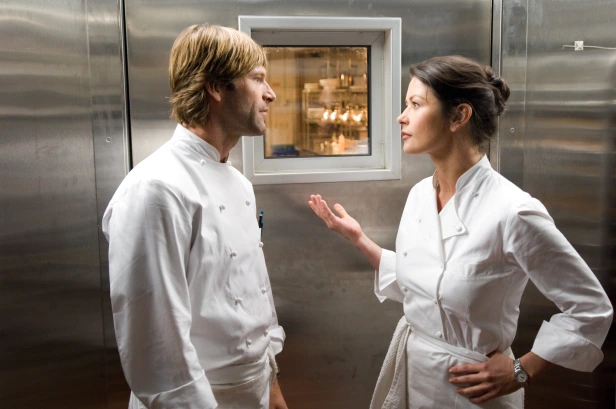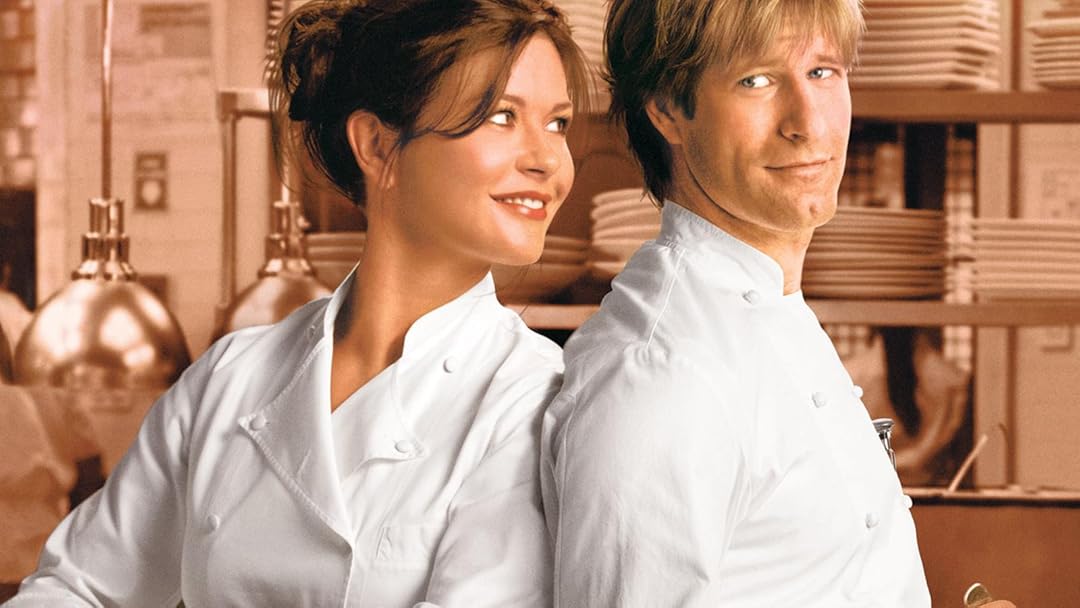🍴 No Reservations (2007)

Review of No Reservations (2007)
Directed by Scott Hicks, No Reservations (2007) is a heartwarming romantic drama that blends culinary art with personal transformation. With Catherine Zeta-Jones and Aaron Eckhart leading the cast, the film is both a love letter to the art of cooking and an exploration of grief, relationships, and the pursuit of happiness. Though it is not a groundbreaking film, No Reservations offers a cozy, feel-good experience, marked by strong performances and an appealing setting.
A remake of the German film Mostly Martha (2001), No Reservations explores the world of haute cuisine through the life of Kate (Catherine Zeta-Jones), a talented and disciplined chef working in a high-end Manhattan restaurant. Kate is a perfectionist, driven by her passion for cooking, yet emotionally closed off, especially after the tragic death of her sister. Her life is turned upside down when she unexpectedly becomes the guardian of her young niece, Zoe (Abigail Breslin), and when a new chef, Nick (Aaron Eckhart), is hired at the restaurant. What follows is a story about healing, love, and learning to open up both in the kitchen and in life.
Plot: A Recipe for Change
No Reservations opens with Kate, a successful yet emotionally distant chef, whose obsession with perfection in her culinary creations has made her both a star in her kitchen and isolated in her personal life. She lives a controlled, solitary existence, finding solace only in her work. However, her world is shattered when she learns of her sister’s untimely death, leaving her with the responsibility of caring for her niece, Zoe (Abigail Breslin). Zoe, a spunky and intelligent young girl, becomes a source of both joy and frustration for Kate, who is unsure how to juggle her professional life with the demands of raising a child.
The narrative takes another turn when Nick (Aaron Eckhart), an easy-going, free-spirited sous-chef, is hired at the restaurant. While Kate and Nick initially clash due to their differing approaches to cooking — Kate’s rigid, methodical style versus Nick’s laid-back, creative flair — their professional rivalry eventually gives way to mutual respect and something deeper. As Kate’s personal and professional worlds collide, she faces the emotional challenges of balancing her career with her new role as a guardian, all while learning to open her heart to those around her.
At its core, No Reservations is a story about personal transformation. Kate must confront her grief, deal with her insecurities, and accept the possibility of happiness in both her career and her personal life. The film explores themes of love, healing, and how food, in its many forms, can serve as a bridge between emotional distance and connection.
Themes: Love, Loss, and Transformation
The most significant theme of No Reservations is personal growth through love and loss. Kate’s journey is one of learning to balance her professional and personal lives, which initially seem incompatible. Her obsessive commitment to her career is mirrored by her inability to connect with her niece, Zoe. Both women are emotionally scarred, albeit in different ways — Kate by the death of her sister, and Zoe by the loss of her mother. Together, they must navigate their grief, and through their interactions, learn the importance of opening their hearts to others.
The film also deals with the theme of work-life balance, especially in high-pressure careers like cooking, where perfection is often expected. Kate’s world is driven by the pursuit of excellence in the kitchen, but it comes at the expense of her personal life and her ability to connect emotionally with others. Her relationship with Nick, who brings a more relaxed and spontaneous approach to cooking, challenges her rigid worldview and teaches her that sometimes, letting go of control can lead to better results — both in the kitchen and in life.
At its heart, No Reservations is about the healing power of love and food. The kitchen, for both Kate and Nick, is a place of creativity and expression. Food becomes more than just nourishment — it is a metaphor for the emotional nourishment Kate and Zoe need to rebuild their fractured lives. The act of cooking together symbolizes the growth and healing that can come from embracing both the art of food and the art of love.
Performances: Catherine Zeta-Jones, Aaron Eckhart, and Abigail Breslin
The film’s performances are among its strongest elements. Catherine Zeta-Jones brings depth and nuance to the character of Kate. She beautifully captures the character’s emotional struggle — a woman who is both powerful and fragile, driven by her need for control but gradually learning to let go. Zeta-Jones’s portrayal of Kate allows the audience to empathize with her, even when her actions seem cold or selfish. Her chemistry with Aaron Eckhart’s Nick is palpable, as they move from professional tension to romantic affection, their developing relationship adding warmth and complexity to the film.
Aaron Eckhart, as Nick, provides a perfect counterbalance to Zeta-Jones’s intense, controlled performance. Nick is charismatic, confident, and easygoing, yet Eckhart manages to make him a fully realized character with vulnerabilities of his own. He brings charm and humor to the role, but also subtle emotional depth, as his growing feelings for Kate serve as a catalyst for her emotional growth. Nick’s approach to cooking, in contrast to Kate’s rigidity, represents the possibility of freedom and creative expression, and Eckhart’s performance highlights the importance of spontaneity in both the kitchen and life.
Abigail Breslin, as Zoe, is a standout in her role as Kate’s niece. Despite being young, Breslin captures Zoe’s intelligence and emotional depth, portraying a child who is wise beyond her years yet still grappling with the loss of her mother. Zoe is the emotional center of the film, and her relationship with Kate — a bond that starts off as strained but gradually deepens — is both heartwarming and poignant.
Direction: Scott Hicks’ Subtle Approach
Scott Hicks, best known for directing Shine (1996), brings a gentle, understated touch to No Reservations. The film’s pacing is slow but deliberate, allowing the characters to evolve gradually and naturally. While the premise of the film may seem predictable at first — a romantic drama with a neat conclusion — Hicks takes care to explore the emotional undercurrents of the characters’ journeys, creating a more complex and rewarding experience. The film does not rush its characters’ emotional arcs, allowing for moments of reflection and personal growth.
The film’s tone is consistently warm and comforting, with moments of humor and lightness balancing out the heavier emotional beats. Hicks also knows when to inject more serious moments, particularly when dealing with themes of grief and loss. The film’s visual style is unobtrusive, using natural lighting and intimate shots to enhance the emotional core of the story without drawing attention to the cinematography.
Setting and Culinary World: A Feast for the Senses
As one would expect from a film set in the world of high-end cuisine, No Reservations features many beautiful shots of food preparation and the artistry of cooking. The film’s setting — a sophisticated Manhattan restaurant — provides a fitting backdrop for the story, and the kitchen becomes a place of both passion and tension. The culinary world is presented as both a high-pressure environment and a place of creative expression. The film makes excellent use of its setting, with scenes of cooking acting as metaphors for the characters’ emotional development.
The food itself is often shown in close-up, emphasizing its beauty and the skill involved in its preparation. These shots not only serve to showcase the art of cooking but also reflect the meticulous nature of Kate’s personality. As the characters work together in the kitchen, cooking becomes a way for them to communicate and connect, symbolizing their growing emotional closeness. The film does a great job of showcasing the ways in which food, love, and creativity can intersect.
Music: A Heartfelt Soundtrack
The film’s soundtrack, composed by Philip Glass, enhances its emotional tone with a blend of classical and contemporary music. The music serves as a reflection of the film’s themes of personal growth, healing, and the warmth of love. The score is subtle, never overwhelming, but it complements the film’s emotional moments, helping to elevate the narrative. The use of classical music in particular reinforces the idea of cooking as an art form, with its precision and emotional depth.
In addition to Glass’s score, the film features a mix of jazz and other genres of music that complement the setting and tone of the film. The music helps to define the atmosphere of the upscale restaurant, adding to the film’s rich sense of place and character.
Conclusion: A Sweet, Satisfying Story of Love and Healing
No Reservations (2007) is a charming and heartfelt film that offers a satisfying blend of romance, comedy, and emotional depth. While it does not break new ground in terms of plot, it excels in its exploration of grief, love, and the complexities of human relationships. Catherine Zeta-Jones and Aaron Eckhart deliver strong performances, and their chemistry is at the heart of the film’s emotional impact. The film’s warm, gentle tone, combined with its focus on the healing power of food and love, makes it a comforting and uplifting watch.
Though predictable at times, No Reservations is a well-crafted and satisfying film that invites viewers to reflect on the importance of balancing career and personal life, the power of emotional connection, and the simple pleasures that come from sharing a meal with loved ones. Ultimately, it’s a story about transformation — both in the kitchen and in the heart — and the ways in which love can heal even the deepest wounds.











